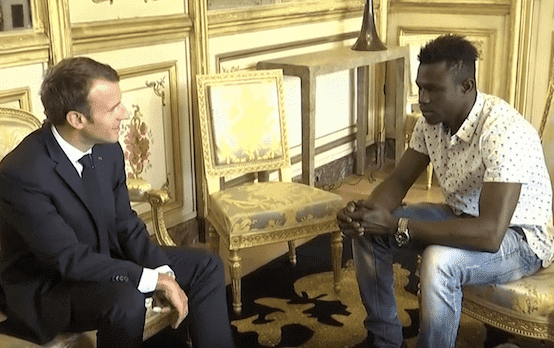
The videotaped rescue last month of a young child dangling from a balcony in Paris is a story both dramatic and heart-warming. And, yes, there’s the added twist that the rescuer, Mamoudou Gassama, dubbed “Spiderman,” is a refugee from Mali who came to France sans-papiers—or, to put it more strictly, illegally.
Yet Gassama is all legal now, because French President Emmanuel Macron invited him to the Élysée palace, where he was honored for “exceptional service to France” and offered French citizenship—which Gassama accepted.
So the entire story might seem to be a happy one, in which the hero receives a just and substantial reward. (The annual per capita income in Mali is about $2000; in France, it’s about $42,000.)
Yet Macron’s civic gesture has received lots of criticism from the left—and that reveals much about the mentality of contemporary leftists.
In a June 1 Washington Post op-ed, Rokhaya Diallo, bylined as “a writer, journalist, filmmaker, and TV host for BET France,” lamented that, Gassama aside, Macron’s government has actually tightened its immigration policy. As Diallo put it, “While the nation elevates an undocumented hero, it is also pursuing harsh measures against immigration and seeking to punish those who try to provide support to migrant people. Migrants shouldn’t need to be superheroes to be acceptable in France.”
Thus we see the problem as the left sees it: Macron has introduced a dreaded concept, merit, into the consideration of citizenship for immigrants. And these days, many on the left see “merit” as just a codeword for discrimination and racism.
Echoing the Post piece, Canada’s Globe and Mail demanded to know, “Aren’t all migrants exceptional, Mr. Macron?” We can observe that while Garrison Keillor is now a non-person in the U.S., his joke about Lake Wobegon still abides internationally: everyone is above average.
Meanwhile, in Britain, The Independent snapped, “What Macron said to the Malian ‘Spider-Man’ hero in Paris about citizenship was incredibly misguided.”
Once upon a time—that is, all of a year ago—Macron was seen in a much different light. Back then, he was a new face, not yet 40 years old, whom many hoped would prove to be a progressive with dash and flair. Of course, Macron’s standing was greatly raised because his opponent in the French elections was the arch-nationalist Marine Le Pen, whom the left execrated as a “fascist.” Thus Macron’s candidacy took on the holiness of an anti-fascist crusade; lefties were thrilled when he clobbered LePen in a two-to-one landslide.
Yet the real Macron was never a progressive; his campaign was notable more for his precocious style than for the prog substance of his platform. Indeed, since taking office, Macron has actually cracked down on migration—or, as some would quaintly insist on calling it, illegal immigration. On May 30, for example, two days after Gassama’s heroism, French police raided an unauthorized migrant camp in Paris; it was their 35th such raid in three years.
It should be noted that the migrants weren’t simply rousted; they were moved to a shelter. After all, Macron is no libertarian, of either the left-wing or right-wing variety. In his view, the homeless cannot be allowed to set up wherever they please, yet they also can’t be left unsheltered. As such, Macron is echoing the stern paternalism of France’s historic tradition: there’s not much ACLU in him, nor much of the Cato Institute. Instead, he harkens back to such figures of the French pantheon as Richelieu (whom this author wrote about here for TAC), Colbert, and DeGaulle.
Today, Macron is co-opting at least some of Le Pen’s energy. As he said earlier this year to a gathering of journalists, “I can’t tell my middle classes who work, who pay taxes, that it’s great, we’re going to welcome everybody into the country. That’s just ridiculous. Who’s going to pay for that?”
Yet Macron, so full of Gallic wiles, deftly refuses to be pigeonholed as a rightist; he can’t afford to become widely regarded as “Trump’s poodle.” In that same session with journalists, he outlined his rationale for a right-tilting immigration stance. Without a crackdown, he said, “You’ll just fuel racism and xenophobia.” So if we translate the tautological politique, we can see Macron’s argument forming: I’m going to fight racism and xenophobia by…not letting in so many foreigners.
Yet by now, the avant-garde left is wise to Macron. Chronicling l’affaire Gassama, South Africa’s Eyewitness News stated the anti-Macron agenda plainly: “Citizenship once represented a set of rights to be demanded from the state as a form of emancipation, for example, in the civil rights and suffrage movements.”
In other words, in addition to open borders, new arrivals should expect immediate and plenteous rights.
Obviously, this is the polar opposite of the classical understanding of citizenship. To the ancient Greeks, and then the Romans—the latter having given us the concept of res publica, the public thing—citizenship was closely held and much prized.
After all, the citizenry had many valuable rights, and for those rights, it willingly bore heavy responsibilities, the heaviest of which was military duty. And yet because army service was so vital, republics sometimes offered non-citizens a path to citizenship—they could earn their way in by fighting. We might note that such martial meritocracy is common to this day. According to a 2009 report, some 119 service members, having fought for the U.S. in Iraq and Afghanistan, received their citizenship posthumously.
Indeed, even in more pacific settings, we see the idea of citizen merit peeping through the naturalization process. Hence this 2018 headline: “Dozens earn U.S. citizenship” [emphasis added].
Perhaps the most vigorous American proponent of small-“r” republicanism was Theodore Roosevelt. In 1910, the by-then former U.S. president found himself, interestingly enough, in Paris, speaking to the Sorbonne. TR’s speech is best remembered for its hymn to “the man in the arena,” but in fact the formal title was “Citizenship in a Republic.” In that talk, TR dealt with the betterment of both the American and French republics, focusing on their populations:
For you and for us the question of the quality of the individual citizen is supreme. The average citizen must be a good citizen if our republics are to succeed. The stream will not permanently rise higher than the main source; and the main source of national power and national greatness is found in the average citizenship of the nation. Therefore it behooves us to do our best to see that the standard of the average citizen is kept high.
TR added that the citizenry of any nation had to be able to pull together for its own sake: “It is a mere matter of common sense to recognize that the State, the community, the citizens acting together, can do a number of things better than if they were left to individual action.” And so, he continued, a sturdy republic needs “good citizens…regulated by a moral sense” who will “work hard” and, if need be, “fight hard.”
The most casual reading of history—in the century since, or in any century before—vindicates TR’s judgment. That is, every nation finds itself in a struggle to survive and thrive, so it helps to have a population of competent team players. Moreover, all too often, a nation finds itself confronting a mortal threat to its very existence. So, yes, the quality of the citizenry, both native-stock and immigrant, matters greatly.
We might wonder: is the left of today, disdaining Macron (and, of course, despising TR), ignorant of this history? Or is it knowingly contemptuous of the past, perhaps because it hopes that in some radiant future, all nations will cease to exist?
Whatever the answer, the en vogue open-borders policies fit right into a profoundly anti-nationalist, even anti-patriotic, mindset. No country truly mindful of its future well-being would, for example, help determine its future citizens by lottery—and, yes, that’s been the law in the U.S. since 1990.
But back to Macron’s France. That country has hardly solved its immigration woes; it is, after all, a part of the European Union, the porous borders of which have led to political convulsions of late. Indeed, the long-term danger of demographic inundation is as dire as ever. (This author wrote about immigration into Europe for TAC back in 2005.)
For now, Macron, mindful of France’s precarious position, must play a careful geopolitical game. Just as he has maintained an equipoise between left and right in his own country, he must maintain, too, a balance, between Donald Trump on the other side of the Atlantic and Angela Merkel on the other side of the Rhine.
Yet it’s worth recalling that France has been an identifiable nation since the days of Clovis I in the sixth century, a 1,500-year track record that suggests that the French know a thing or two about survival. Indeed, the lyrics of La Marseillaise proclaim French nationalism in the starkest terms: “To arms, citizens!/ Form your battalions/ March, march/ Let impure blood/ Water our furrows.”
Yes, we can pause over the word “citizens.” After all, a country can’t survive without good citizens. It would appear that Macron just added a good one in Gassama, and yet, at the same time, he is being choosy. As he must.
James P. Pinkerton is an author and contributing editor at TAC. He served as a White House policy aide to both Presidents Ronald Reagan and George H.W. Bush.
Sourse: theamericanconservative.com






